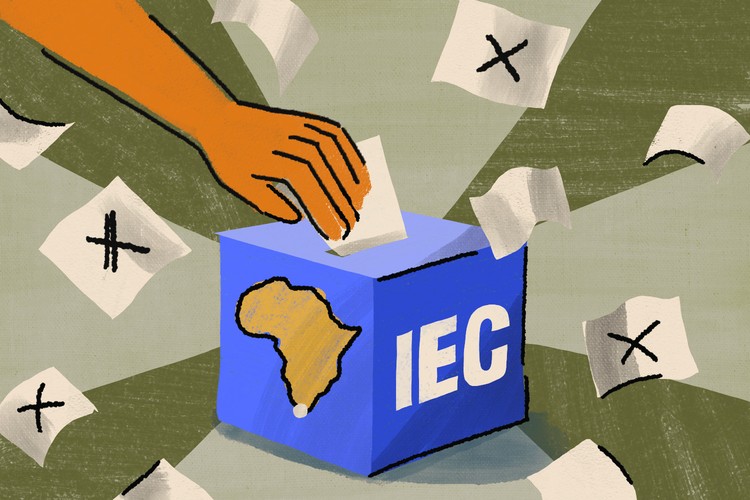But the right of prisoners to vote has at times been resisted by the government and the Independent Electoral Commission
Prisoners will be able to vote in the May elections. Illustration: Lisa Nelson
- Prisoners in South Africa may vote in national and provincial elections, but not in local elections.
- 15,000 inmates voted in the 2019 general election.
- The Independent Electoral Commission (IEC) hopes to increase this to 100,000.
- Past attempts by the government and the IEC to limit prisoner voting rights have been blocked by the Constitutional Court.
A man serving a 25-year sentence in Kgosi Mampuru prison told GroundUp he is looking forward to voting in the 2024 general election.
The Independent Electoral Commission (IEC) visited the prison earlier in the year and all inmates with identity documents were able to register, he said.
“Politics affects everyone … Almost everything is in shambles in the country. There is no department that is functioning properly. That is why I want to vote,” he said.
In the 2019 general election 15,000 prisoners voted. The IEC hopes to increase this to 100,000. There are about 157,000 prisoners in South Africa’s correctional facilities.
IEC spokesperson Kate Bapele said all correctional facilities in the country had been visited at the end of January for voter registration.
However, the IEC could not say exactly how many prisoners are on the voters’ roll for the 2024 election, because registered voters are categorised in their voting region. Statistics of how many prisoners voted will be made available after the election.
One issue affecting prisoners is that many of them do not have identity documents, or their IDs are with their families.
“In preparation for the inmates’ voter registration, the IEC … reached out to the families of inmates to deliver identity documents to correctional facilities,” said Bapele.
Right to vote tested
The right of prisoners in South Africa to vote in the country’s general elections (national, provincial and regional) has been upheld by the Constitutional Court. But prisoners cannot vote in local (municipal) elections. Only a few other African countries – Ghana, Kenya, Nigeria, Zambia and Uganda – have granted prisoners the right to vote.
A global review by Penal Reform International found that 45% of the 66 countries it surveyed did not allow convicted prisoners to vote.
The right of prisoners to vote in South Africa has however faced resistance from the IEC and the government several times, but the courts have consistently overturned attempts to limit this right.
Prisoners were not allowed to vote during apartheid. Ahead of the historic 1994 election, prison riots across the country pressured the transitional government to extend the right to vote to prisoners. More than 20 prisoners died in prison fires set during the protests.
Prisoners were allowed to vote in the 1994 election, but in the 1999 general election, the IEC tried to exclude prisoners from voting. This was challenged in the Constitutional Court by a group of prisoners. Although the court overturned the IEC’s decision, it did not go so far as to declare that prisoners could never, under any circumstances, be denied the right to vote.
In 2003, Parliament amended the Electoral Act to prohibit convicted prisoners who are serving sentences without an option of paying a fine from voting or even from registering to vote.
The National Institute for Crime Prevention challenged the amendment in the Constitutional Court.
The Department of Home Affairs, a respondent in the case, said the government had insufficient resources to facilitate voting stations in prisons and that doing so would favour prisoners over others who had difficulty accessing voting stations.
The department also said that given the high crime rates in the country, it was important for the government to take a stance against crime.
The government lost the case. The court said that the right to vote is one of the foundational rights in section 1 of the Constitution, and that the government’s justification for limiting that right was neither reasonable nor proportional, as required by section 36 of the Constitution.
Professor Lukas Muntingh of the Dullah Omar Institute at the University of the Western Cape told GroundUp that the right of prisoners to vote is progressive, and a “bulwark against rights erosion.”
Given our history, he said, excluding people from voting is “very, very dangerous territory to move into”.
“Imprisonment, the deprivation of liberty is the punishment. Why must the right to vote be removed?”
The position of many South Africans is that people who have committed serious crimes should be deprived of their right to vote. “It’s a popular position, but it’s not a constitutional one,” said Muntingh.
SOURCE: GroundUp on | By Daniel Steyn



